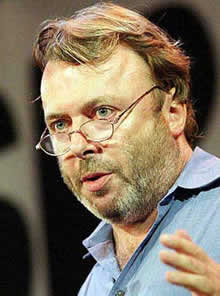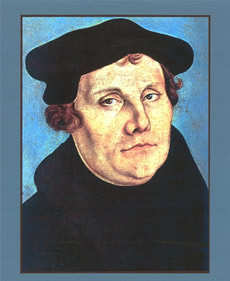The Absence of God's Presence:
Mother Teresa, Martin Luther, and Psalm 46
For Sunday November 25, 2007
Lectionary Readings (Revised Common Lectionary, Year C)
Jeremiah 23:1–6
Luke 1:68–79 or Psalm 46
Colossians 1:11–20
Luke 23:33–43
 |
Christopher Hitchens. |
Was Mother Teresa a spiritual fraud? Maybe even a closet atheist?
Those unlikely questions have dogged her book of private correspondence called Come Be My Light (2007). In numerous letters, which she repeatedly begged her superiors to destroy, Mother Teresa describes her experiences of profound spiritual darkness that haunted her for fifty years. She admits that she didn't practice what she preached, and laments the stark contrast between her exterior demeanor and her interior desolation: "The smile is a big cloak which covers a multitude of pains. . . . my cheerfulness is a cloak by which I cover the emptiness and misery. . . . I deceive people with this weapon."
Mother Teresa describes the absence of God's presence in various ways—an emptiness, loneliness, pain, spiritual dryness, or lack of consolation. "There is so much contradiction in my soul, no faith, no love, no zeal. . . . I find no words to express the depths of the darkness. . . . My heart is so empty. . . . so full of darkness. . . . I don't pray any longer. The work holds no joy, no attraction, no zeal. . . . I have no faith, I don't believe." She rebukes herself as a "shameless hypocrite" for teaching her sisters one thing while experiencing something far different. David Van Bima of Time magazine calls this disparity between her private and public worlds "a startling portrait in self-contradiction" (August 23, 2007).
That's nothing compared to the zealous atheist Christopher Hitchens (God is Not Great) of Vanity Fair. In his review of Come Be My Light (Newsweek September 10, 2007), he argues that Mother Teresa's faith caused her desolation, that her struggles were “the inevitable result of a dogma that asks people to believe impossible things and then makes them feel abject and guilty when their innate reason rebels.” Which is more striking, Hitchens asks: "that the faithful should bravely confront the fact that one of their heroines all but lost her own faith, or that the Church should have gone on deploying, as an icon of favorable publicity, a confused old lady whom it knew had for all practical purposes ceased to believe?"
Despite the headlines, Mother Teresa's darkness was hardly unique in Christian thinking or experience. The Gospel this week reminds us that Jesus endured a grotesque Roman execution between two criminals. With his last gasping breaths he screamed, "My God, my God, why have you forsaken me?" The loitering soldiers, their dirty work done, sneered, indulged themselves in sadistic torture, spat upon their victim, and dropped to their knees in mock worship: "He saved others; let him save himself" (Luke 23:35). Then they rolled the dice to divvy up his filthy clothes.
The apostle Paul writes how he was "harassed at every turn—conflicts on the outside, fears within" (2 Corinthians 7:5). With disarming candor, brutal realism, unqualified empathy, and wry humor, the early monastics describe how in the expansive solitude of the Egyptian desert they discovered a cacophony of voices in the interior geography of the human heart. They dreaded what they called the "noonday demon" of acedia, a palpable anxiety that suggests parallels to clinical depression. St. Makarios of Egypt (5th century) was blunt: "I am convinced that not even the apostles, although filled with the Holy Spirit, were therefore completely free from anxiety. . . Contrary to the stupid view expressed by some, the advent of grace does not mean the immediate deliverance from anxiety."
 |
Mother Teresa. |
A thousand years later, the Spanish mystic John of the Cross (1542–1591) made famous a phrase that has passed into our every day lexicon—the "dark night of the soul." The 19th-century French Carmelite Thérèse of Lisieux once told her fellow nuns,"If you only knew what darkness I am plunged into." She compared her spiritual desolations to a dark tunnel.
Others have drawn parallels between the experiences of Mother Teresa and Martin Luther (1483–1546). Luther used the German word Anfechtungen to describe his chronic interior struggles with God. Scholars struggle to evoke the rich complexity of Anfechtungen; it's a word that's hard to translate but easy to appreciate. Anfechtungen precipitated what Martin Marty calls a “delicious despair” or crisis of certainty for which the believer could only cast himself upon the mercy of God. Marty hangs his whole biography of Luther on the word: “God present and God absent, God too near and God too far, the God of wrath and the God of love, God weak and God almighty, God real and God as illusion, God hidden and God revealed.” Anfechtungen, says Marty, are “the spiritual assaults that Luther said kept people from finding certainty in a loving God.”
Luther found great solace in Psalm 46, and some have even called it his favorite psalm. The ancient poem begins with metaphorical descriptions of global cataclysms—the earth giving way, mountains crumbling into the sea, and waters that "roar and foam." On the political front, "nations are in an uproar, kingdoms fall." Nevertheless, says the psalmist, "The Lord Almighty is with us / The God of Jacob is our fortress." He advises us to "be still and know that I am God," for God "makes wars cease, breaks the bow, shatters the spear, and burns the shields."
In 1527, the "deepest year of Luther's depression" according to Roland Bainton, Psalm 46 inspired Luther to write his classic hymn "A Mighty Fortress" (translated from the German by Frederick Hedge in 1853):
A mighty Fortress is our God, a Bulwark never failing,
Our Helper He amid the flood of mortal ills prevailing.
For still our ancient foe doth seek to work us woe;
His craft and power are great; and, armed with cruel hate,
On earth is not his equal.Did we in our own strength confide, our striving would be losing;
Were not the right man on our side, the man of God's own choosing.
Dost ask who that may be? Christ Jesus, it is He;
Lord Sabaoth His name, from age to age the same,
And He must win the battle.And though this world, with devils filled, should threaten to undo us,
We will not fear, for God hath willed His truth to triumph through us.
The prince of darkness grim, we tremble not for him.
His rage we can endure, for lo! his doom is sure;
One little word shall fell him.That Word above all earthly powers, no thanks to them, abideth;
The Spirit and the gifts are ours through Him who with us sideth;
Let goods and kindred go, this mortal life also;
The body they may kill: God's truth abideth still;
His kingdom is forever.
 |
Martin Luther. |
For Luther, believers should not imagine that they will be spared "the flood of mortal ills prevailing." We can, though, experience a deep security in the words of Psalm 46, that however much the earth shakes, a more powerful God is with us and for us wherever we find ourselves. We rest in the knowledge not that the darkness will always turn to dawn—Mother Teresa's "dark night" lasted fifty years—but in the confidence that God in Christ says to us, “I am more certain to you than your own heart and conscience.”
For further reflection:
* See Kathryn Greene-McCreight, Darkness Is My Only Companion: A Christian Response to Mental Illness.
* Meditate on George Herbert's (1593–1633) poem Affliction (IV) , a poignant confession of his inner struggles:
BROKEN in pieces all asunder,
Lord, hunt me not,
A thing forgot,
Once a poor creature, now a wonder,
A wonder tortur’d in the space
Betwixt this world and that of grace.My thoughts are all a case of knives,
Wounding my heart
With scatter’d smart,
As wat’ring pots give flowers their lives.
Nothing their fury can control,
While they do wound and prick my soul.All my attendants are at strife,
Quitting their place
Unto my face:
Nothing performs the task of life:
The elements are let loose to fight,
And while I live, try out their right.Oh help, my God! let not their plot
Kill them and me,
And also thee,
Who art my life: dissolve the knot,
As the sun scatters by his light
All the rebellions of the night.Then shall those powers, which work for grief,
Enter thy pay,
And day by day
Labour thy praise, and my relief;
With care and courage building me,
Till I reach heav’n, and much more, thee.





